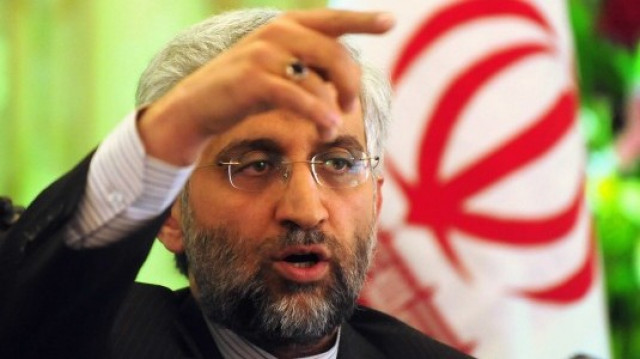Iran's foreign ministry to lead nuclear talks with world powers
Since 2007, sporadic negotiations have been held by Saeed Jalili, head of Iran's Supreme National Security Council.

Saeed Jalili will no longer conducts the negotiations with the world powers. PHOTO: AFP
Since 2007, sporadic negotiations have been conducted by Saeed Jalili, head of Iran's Supreme National Security Council and a veteran of the Iran-Iraq war who was seen by Western interlocutors as an uncompromising ideologue.
Announcing Rouhani's move, the state news agency, IRNA, gave no further detail as to who would be the chief negotiator to replace Jalili. But there were indications that Foreign Minister Mohammad Javad Zarif could either lead the Iranian negotiating team himself or appoint another foreign ministry official.
"This is an encouraging development. Zarif is a very skilled diplomat and the negotiating team he appoints will be knowledgeable and creative. This hardly ensures a deal, but it does suggest Iran will engage in earnest diplomacy," Cliff Kupchan, a director and Middle East analyst at risk consultancy Eurasia Group, told Reuters.
Rouhani, a relative moderate elected in June to replace conservative hardliner Mahmoud Ahmadinejad, may be trying to streamline nuclear diplomacy and exert more influence, although Iran's most powerful authority, Ayatollah Ali Khamenei, retains the final say on any proposed deals.
In Washington, State Department spokeswoman Jen Psaki said the United States was aware of the reports that responsibility for the talks had been transferred to Iran's foreign ministry.
"We reiterate our hope that the Iranian government will engage substantively with the international community to reach a diplomatic solution to Iran's nuclear program and to cooperate fully with the (International Atomic Energy Agency) in its investigation," she said, referring to the UN nuclear watch dog.
"The inauguration of President Rouhani presents an opportunity for Iran to act quickly to resolve the international community's deep concerns over Iran's nuclear program," Psaki said. "Should this new government choose to engage substantively and seriously to meet its international obligations and find a peaceful solution to this issue it will find a willing partner in the United States.”
The last round of negotiations in April with the United States, Russia, China, Britain, France and Germany again fell short of any breakthrough. However, some believe more progress can be achieved under Rouhani, who has pledged a more conciliatory and transparent approach to foreign policy by the Islamic Republic.
The powers are keen to restart negotiations quickly amid concerns over Iran expanding its nuclear capacity. They believe Tehran's nuclear work is aimed at giving it the capacity to make bombs. Iran denies this and says it needs nuclear power for energy generation and medical research.
European Union foreign policy Chief Catherine Ashton, who oversees negotiations with Iran on behalf of the six powers, said they were ready to hold a new round as soon as possible.
"We are in touch with the Iranian side and as the high representative has already told the Iranian foreign minister in their phone conversation in August, we stand ready to resume negotiations," said Ashton's spokesman, Michael Mann.
Frustrating pace
Diplomats have said the six powers had hoped to hold talks in September but no dates have been set so far, while Ashton waited for the appointment of a new Iranian negotiator before making suggestions.
Russia has expressed alarm at the slow progress in agreeing the next six-party talks with Iran.
"The process of forming (Iran's) delegation has still not been finalised and this worries us," Deputy Foreign Minister Sergei Ryabkov was quoted as saying by the state RIA news agency. "We call on other members of the 'six' and Iran to agree as soon as possible the place and time of the next round."
The six world powers have demanded that Tehran cease enrichment of uranium to a fissile purity of 20 percent to reduce concerns that it could be used for nuclear weapons. Rouhani has defended Iran's "right" to enrich uranium, a precondition that has help derail any progress in past talks.
Nuclear experts say Rouhani's announcement of foreign ministry stewardship of the talks could mean more flexibility on the Iranian side, but cautioned that prospects for a quick deal in the decade-old nuclear standoff were slim.
"Iran's negotiating partners will be delighted at this news," said Mark Fitzpatrick of the International Institute for Strategic Studies. "After two years of sitting across from the lecturing, uncompromising and charisma-challenged Jalili, they now have an interlocutor who will want to do business.
"But it certainly doesn't mean the West's troubles are over. There are plenty of sceptics in Tehran, beginning with Supreme Leader Khamenei, who don't necessarily want to strike a deal."



















COMMENTS
Comments are moderated and generally will be posted if they are on-topic and not abusive.
For more information, please see our Comments FAQ